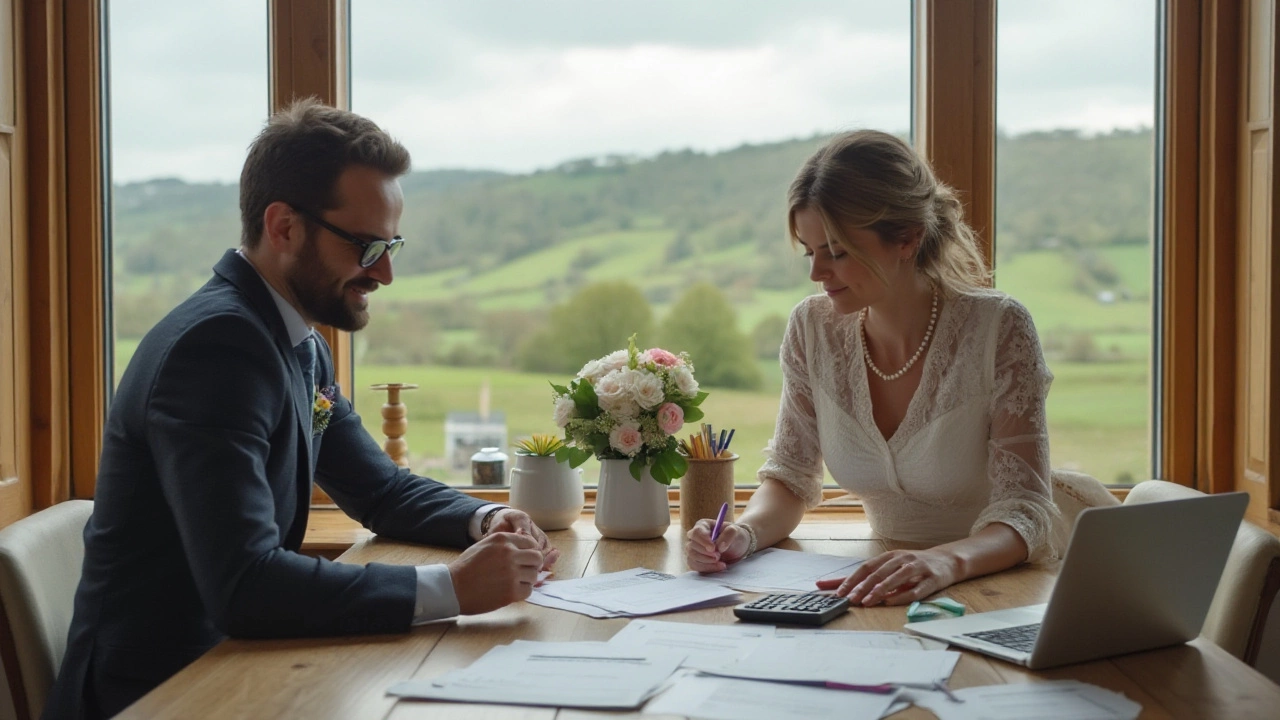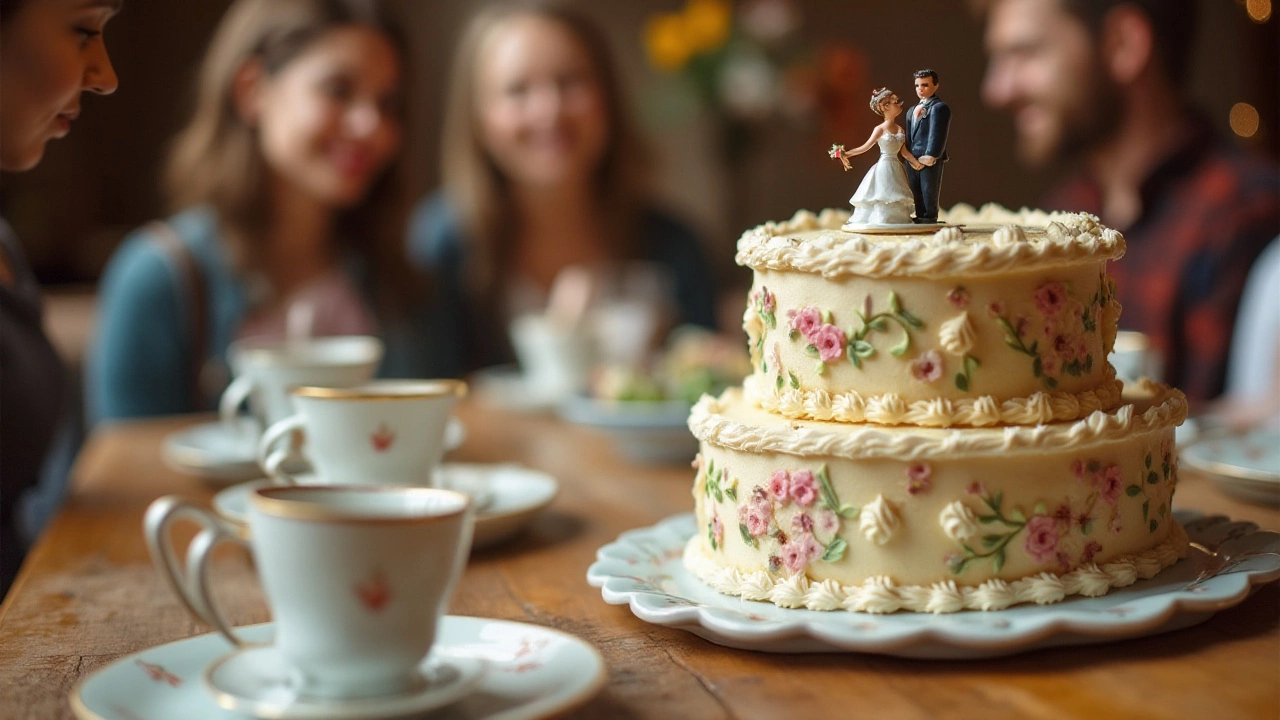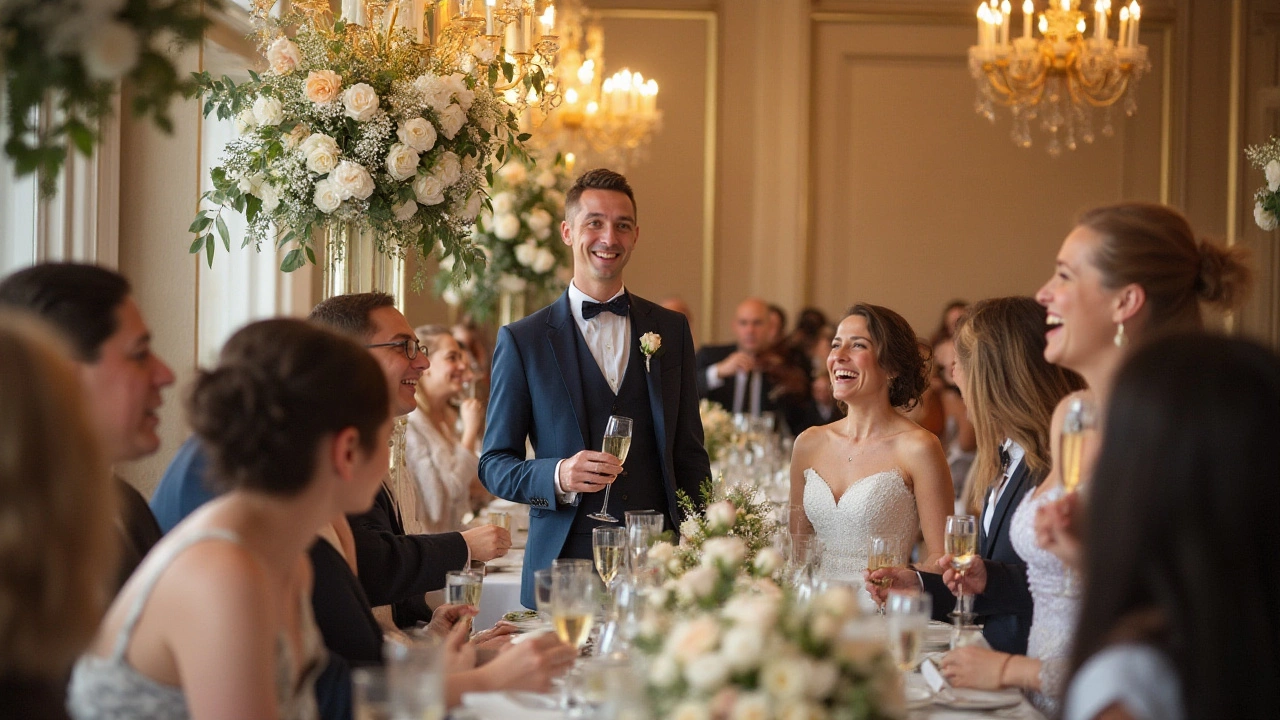Planning a wedding is an exciting journey, full of anticipation and love. But amid all the dreaming, there looms a crucial question — how much will it all cost? Crafting a wedding budget can feel like navigating a maze, but with a bit of guidance, it's entirely achievable.
Weddings can range dramatically in cost, and understanding this can help you set realistic expectations from the start. From venues to dresses, flowers to food, each decision impacts the budget. Knowing where to allocate your funds wisely is key to having the celebration you've envisioned without breaking the bank.
This guide aims to shed light on setting an achievable wedding budget. We’ll explore the significant expenses, identify areas where you can save, and highlight creative ways to make the most of your money, ensuring your special day is everything you dreamed it could be.
- Understanding Your Financial Limitations
- Key Expenses to Consider
- Where to Save and Where to Splurge
- The Importance of Contingency Funds
- Creative Cost-Cutting Strategies
Understanding Your Financial Limitations
As exciting as planning your wedding day can be, the financial aspect can also be quite overwhelming for many couples. Before diving into booking venues and buying that perfect dress, it’s crucial to have a firm grasp on your wedding budget. This involves taking a hard look at your finances and figuring out what you can realistically afford without compromising your future. Start by reviewing your savings and any contributions from family or friends. It will also help to consider how much you can save leading up to the big day. According to The Knot's Real Weddings Study, the average cost of a wedding in Australia is around AUD 36,000, though this can vary widely based on location and circumstances.
It's essential to be honest with yourself about your priorities and to communicate openly with your partner about financial limitations. While it's easy to get carried away with the idea of a fairytale wedding, remember the importance of starting your marriage on a solid financial footing is paramount. Create a spreadsheet or use one of many budgeting apps to track income, savings, and expenses. This will help you identify any possible shortfalls ahead of time and ensure you do not commit beyond your means. Regularly update this as your planning progresses to keep your goals clear and focused.
One way to understand your spending limits is by listing out the must-haves for your ceremony and reception. Decide what elements you’re willing to negotiate on, whether it’s the date, the venue's extravagance, or the size of the guest list. Establishing these parameters will prevent little extras from adding up and eating into your budget. Consider starting with a rough percentage allocation of your budget for key areas like venue, catering, attire, and photography. Keep in mind these percentages might vary based on your personal preferences and what you value most.
Frank Hodge, a financial expert, once said, "A successful wedding budget is about balancing dreams with monetary realities."
Couples should also prepare for unforeseen expenses—these often find a way to creep in despite the most meticulous planning. It's wise to set aside at least 5% of your total budget for emergencies and last-minute adjustments. This buffer can prevent financial stress and allow you to handle unexpected situations gracefully. Remember that flexibility and adaptability are your allies as you navigate the waters of wedding planning.
Ultimately, the key to successfully managing your budget lies in understanding and accepting your financial limitations. By setting realistic expectations and maintaining open communication, you can create the wedding experience that celebrates love without sacrificing your financial wellbeing. Integrating solid financial habits in your wedding planning can lay a great foundation for managing finances in your married life, ensuring peace of mind for both you and your partner.
Key Expenses to Consider
When planning a wedding, it's crucial to have a clear understanding of where your money will be going. A significant portion typically goes to the wedding venue, which can consume nearly half of the total budget. This covers the cost of renting a suitable space for both the ceremony and the reception. Many couples opt for venues that provide packages including catering, decor, and sometimes even accommodations, merging costs into a comprehensive fee. Venues in larger cities or popular destinations will naturally demand a higher price, but there are plenty of lovely hidden gems, often in rural areas, that offer stunning backdrops at a fraction of the cost.
The next major expense on the list is catering. Feeding your guests is one of the most significant costs you’ll incur, often taking up around 30% of the budget depending on the choice of menu and service style. Whether you prefer a formal sit-down dinner, buffet style, or fun food stations, costs can vary dramatically. Don't forget to factor in drinks! An open bar can substantially increase the expense; a prudent alternative is a cocktail reception or offering a selection of complimentary wines and beers.
“Your wedding catering is where you can get creative and playful – it's your opportunity to give guests a taste experience to remember,” notes Tracie Morris, a renowned Australian wedding planner.
Wedding attire is another essential part of the budget. The bride’s dress, groom’s suit, and outfits for the bridal party require careful consideration. While some couples might choose designer gowns or tailor-made suits, thrifty couples might explore renting options or selecting pieces from reputable high street brands. Don't forget accessories, shoes, and alterations, which can increase this expense. Photography and videography are cherished investments; capturing the precious moments of your day often demands a large budget allocation, about 12% on average. Good professionals tend to book up quickly, so early planning is essential.
Finally, let’s not overlook the costs of decor and flowers. These elements bring your wedding vision to life. From bouquets and boutonnieres to centerpieces and ceremony garlands, flowers can breath life into any venue. Many couples get creative with DIY projects, either to add a personal touch or to cut costs. Rentals for necessary items like chairs, tables, and linens are also included here. Not all expenses are obvious at first glance, so prioritize according to what matters most to you, setting aside some funds for unexpected expenditures.
Understanding these key expenses will help you strategize effectively, allowing you to align your dreams with your financial capacity, avoiding stress. Pride yourself on making savvy decisions, and your wedding day will surely be a reflection of both your love and your planning prowess. To aid in visualizing these expenses, here is a breakdown of typical wedding budget allocations:
| Expense Category | Percentage of Budget |
|---|---|
| Venue | 45% |
| Catering | 30% |
| Attire | 10% |
| Photography/Videography | 12% |
| Decor/Flowers | 13% |

Where to Save and Where to Splurge
When it comes to planning a wedding budget, knowing where to pinch pennies and where to spend lavishly can make a world of difference. Every couple deserves to feel special on their big day, and part of that magic comes from making informed decisions about where to allocate funds. While it's essential to save in some areas, certain elements might warrant a more generous portion of your budget.
Start with the guest list. It's one of the most significant factors influencing your wedding expenses. A smaller, intimate gathering can afford you the luxury to spend more on other particulars such as gourmet meals or a high-end photographer. It can also create a more meaningful experience for both you and your guests since you can spend quality time with each attendee. Think of it as quality over quantity. Rather than a large venue trying to fit everyone you've ever met, consider charming, smaller venues that provide a cozy atmosphere.
Speaking of venues, flexibility with the location can result in significant savings. Opting for a weekday or off-season wedding can dramatically cut costs. Additionally, some couples find that hosting the ceremony and reception at the same location can reduce logistical expenses. If a courthouse wedding suits your style and budget better while reflecting your relationship authentically, don't hesitate. The beautiful thing about today’s wedding landscape is its diversity and acceptance of all types of celebrations.
Next up is food and drink. It's true that catering is one of the highest costs, so where should you draw the line? Opt for a reduced menu or a buffet instead of a sit-down meal to cut costs without sacrificing quality. If a particular champagne or wine is significant to you, splurge on those specific drinks while keeping the rest of the bar more streamlined. A wedding cake might not be essential for every couple. Consider less traditional dessert options, like cupcakes or even a dessert table with a variety of sweet treats that cater to different tastes.
Now for the splurges. Should you invest in a wedding planner? For many couples, the peace of mind that comes with professional wedding planning services is well worth the expense. They can offer invaluable guidance, access to exclusive deals, and help alleviate stress, allowing you to enjoy the engagement period. High-quality photography and videography are often recommended splurges. As these professionals preserve the day’s memories, investing in a skilled photographer can ensure you have timeless mementoes.
Decor and Attire
When it comes to attire, the choice between saving and splurging can truly vary based on personal priorities. For those who have dreamt of a designer wedding dress, allocating funds here might be vital. On the other hand, some brides seek out rental services or buying options from trunk shows to save while still donning a gown they love. Grooms can also find stylish options without the hefty price tag by exploring tailored rental services. Concerning decor, explore DIY methods for areas like centerpieces or favors. Create personalized designs, or consider renting items like linens and decor pieces to achieve that luxe look for less.
Lastly, let’s touch on entertainment. Hiring a talented DJ or a live band can make or break the party atmosphere. Viewing entertainment as an investment instead of an area to cut costs can keep the dance floor alive all night. However, if live music isn’t a priority, consider a mix of a playlist curated by a friend with DJ skills, which can still maintain a vibrant energy without stretching your budget unnecessarily.
As wedding expert Emily Roberts suggests, "Decide what you value most about the day's experience and allocate your budget accordingly. You want to look back and feel joy about where and how your money was spent."
The Importance of Contingency Funds
When planning a wedding, even the most meticulously laid plans can encounter the unexpected, which makes setting aside a contingency fund not just wise, but essential. This fund acts as a cushion for any extra expenses that arise, providing a sense of security as the day approaches. Imagine discovering, a week before the wedding, that a certain vendor has misquoted the cost due to an overlooked detail. It's these kinds of unforeseen situations where a contingency can save the day by covering the shortfall without causing panic or financial strain. Most experts recommend allocating around 5-15% of your total budget to a contingency fund. This percentage ensures breathing room for adjustments and means you're prepared for various eventualities, from last-minute guest additions to unexpected weather changes necessitating additional arrangements.
One of the lesser-discussed yet frequent challenges relates to vendor relationships and the cost fluctuations that can occur over months of planning. Exchange rates, inflation, and even product availability can influence final costs. A contingency fund helps bridge these financial gaps seamlessly. As weddings become increasingly personalized, the potential complexities grow; hence, this financial buffer mitigates potential re-negotiation stress. Speaking of unexpected realities: did you know that according to a study by The Knot, about 45% of couples end up spending more than they initially planned on their weddings? With a well-thought-out contingency, peaceful nights replace those spent fretting over potential extra expenditures.
An additional benefit of having a committed contingency fund is the flexibility it offers for capturing those last-minute serendipitous finds. Often during the final stages of planning, couples stumble upon unique decorative ideas or fun extras that weren't part of the initial plan but would enhance the celebration. Having set aside a portion of your budget for surprises like these can turn spontaneous desires into reality rather than missed opportunities. Remember, unplanned purchases can be delightful additions, rather than stress-inducing splurges, when they're made possible by this forethought. As renowned event planner Colin Cowie once said, "The best-laid plans can go awry, but budgets that breathe are the ones that save the day along with your sanity."
Even logistics on the wedding day can necessitate dipping into your contingency. For instance, if transport issues arise, and an extra shuttle or limousine becomes necessary, these funds ensure the solution is quick and decisive. Perhaps the makeup artist needs a replacement after an unexpected illness or a rainstorm requires additional coverage for your outdoor spaces. Embracing the philosophy of preparation over reaction helps not only in managing finances during your planning phase but also fosters a mindset of calm adaptability, which is crucial as the big day approaches. By understanding that the only constant is change, you empower yourself not just financially but emotionally as well.

Creative Cost-Cutting Strategies
No matter the size of your wedding budget, finding ways to save without sacrificing style or quality can make a big difference. Weddings are joyous occasions, but the financial burden can weigh heavily on planning couples. Fortunately, there are several creative strategies you can employ to trim costs while creating a memorable experience for you and your guests.
To start, consider the timing of your special day. Opting for a weekday or a morning ceremony can significantly reduce venue rental fees. Many venues offer considerable discounts for events held outside peak wedding seasons or during less traditional hours. By timing your wedding wisely, you can enjoy the same stunning location at a fraction of the price you'd pay for a Saturday evening affair.
Next, think carefully about the guest list. While it may be tempting to invite everyone you know, keeping the list intimate allows for a more personal celebration. With fewer guests, the costs of catering, seating, and accommodations decrease. Designing a guest list that reflects the most important people in your lives enables you to allocate more resources to things that matter most to you, such as your attire or photography.
Embrace DIY elements where possible, as they can provide substantial savings. Crafting your invitations or centerpieces offers a personal touch that guests will appreciate. You can also get friends and family involved. Look to skilled relatives or friends who can contribute talent, whether it's baking, floristry, or entertainment, often at costs far below professional rates. This not only reduces expenses but also involves loved ones in your celebration more deeply.
An intriguing way to save is by reconsidering the traditional menu. Rather than a formal sit-down dinner, explore a beautifully curated buffet or themed food stations. This not only lightens the financial load but also creates an engaging dining experience for your guests. You can focus on serving high-quality dishes that mean something to you as a couple, perhaps drawing on favorite flavors or cuisines, making the meal memorable and meaningful.
As wedding planner Jessica Lacey notes: "Personal touches and flexibility can turn a budget-friendly wedding into a bespoke, unforgettable celebration."
Think outside the box when it comes to decorations. Nature-themed weddings can take advantage of existing scenery, such as gardens or beaches, minimizing the need for lavish décor. If your venue has an inherent beauty, allow it to shine. Utilize seasonal flowers that reduce import costs and take advantage of abundant, inexpensive garden blossoms with vivid colors that match your theme.
Finally, remember the value of negotiation. Suppliers and vendors often have margins they can work with. By discussing your budget constraints with them, you might uncover discounts or added-value services. Be open to off-the-menu suggestions that may cost less, yet deliver unique experiences that delight attendees. Becoming comfortable with negotiation can lead to fruitful results, enabling a big dream on a modest budget.
